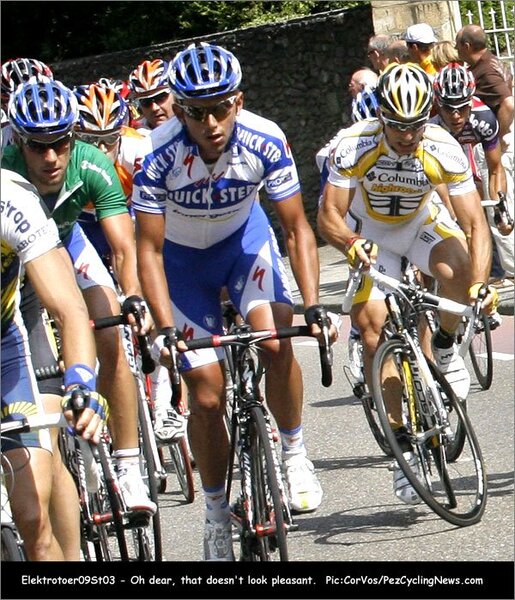You are using an out of date browser. It may not display this or other websites correctly.
You should upgrade or use an alternative browser.
You should upgrade or use an alternative browser.
Aluminium handlebars - safe?
- Thread starter jaypee
- Start date
mattr":3jpjc69s said:lewisfoto":3jpjc69s said:The vast majority of bars are either aluminum or carbon and carbon is far more likely to fail that aluminum.Fatigue properties of carbon are orders of magnitude better than aluminium. Carbon fails when its abused, misused or damaged. Aluminium has all these issues as well, plus it fails when you use it. Eventually.
I don't have much faith in carbon. During the years I worked at the bike shop I can't count the number of people who came in with "I was just riding along when..." my stem broke, my seat post broke, the bottom bracket cracked, the derailleur hanger fell off etc. etc. etc. The problem with carbon is it can fail from a modest mark in the top layer, one the rider probably never noticed.
Steven
Attachments
Mr.Toad
Senior Retro Guru
Steven, that pic made me cringe......hitting the dirt hurts, hitting the pavement hurts tenfold.
I agree that alloy bars can and do fail, i've seen it before but have never had one fail on me personally.
Just check the bar every now and then and look for deep scratches as well. I believe that might also weaken the alloy.
Given a choice i'd run titanium bars, then alloy bars that haven't seen a tough life.
I agree that alloy bars can and do fail, i've seen it before but have never had one fail on me personally.
Just check the bar every now and then and look for deep scratches as well. I believe that might also weaken the alloy.
Given a choice i'd run titanium bars, then alloy bars that haven't seen a tough life.
Circumferential scratches are bad on any bar or seatpost. They create a stress rizer where a crack may initiate over time. Never mark your seatpost height by simply scribing a line above the clamp, for instance!
Lengthwise scratches are less a concern. They don't create the same stress riser.
J
Lengthwise scratches are less a concern. They don't create the same stress riser.
J
I had some x lite Ti bars - must of been 10 years + old. I swapped out some gear, removed the grips and found a 6cm long crack, length ways beneath where the grip sits.
That one was recycled straight away! It went to someone on here to make something bike related. But it was luck that I spotted it before it did me a mischief.
That one was recycled straight away! It went to someone on here to make something bike related. But it was luck that I spotted it before it did me a mischief.
konahed":2lhzlet5 said:Are titanium handlebars safe?
Ti is different, it has a different tolerance to repeated flexing and fatigue affects it differently too -someone will be along to articulate this in a minute I bet
But the precautions are the same when used in high stress areas like handlebars. Be especially cautious using parts that are old and well used or are 2nd hand and you don't what has happened to them in the past. i.e check it for imperfections: crush marks, dents, bulges, cracks are all visible warning signs that there is a weakness. Be fussy. Remove and replace rather than risk it IMO
All metals will eventually fail through flexing it's just that aluminium will fail faster due to it's properties, it's one of the main reasons why alu frames are stiff and dead feeling as they are designed not to flex so they don't fail. If an Alu frame was made like a steel or Ti frame it would last about 5 minutes before it cracked and failed. The thinner and lighter you go with the bars the more they will flex and the quicker they will fail so the Zoom 155's I used to run are now quite rare as are things like RC130's (I wouldn't even consider these unless NOS) as most are past their use by date.
It's a long time since I was at college doing this sort of thing, as long ago as when I had the Zoom 155's!
Carl.
It's a long time since I was at college doing this sort of thing, as long ago as when I had the Zoom 155's!
Carl.
except that almost all carbon has a decorative protective outer layer and clear coat which provide no structural strength at all. So your "modest marks" is more likely to be "bloody great gouges and scrapes".lewisfoto":1vhe7s7h said:The problem with carbon is it can fail from a modest mark in the top layer, one the rider probably never noticed.
Steven
I'd be more worried about aluminium with "modest marks" than carbon. It's basic materials science.
I'd suspect that we don't see much failed aluminium as it gets binned long before fatigue gets hold of it. Whereas customers dropping $200+ on a carbon bar will a) want to use it for much much longer than a $50 aluminium bar. And b) rather than fitting it properly (with friction paste) will just swing on the Allen key until it stops moving. An aluminum/aluminium interface needs significantly less torque to stop slipping than carbon/aluminum or carbon/carbon. Bingo, crushed handlebars before you even get them out of the house!
Similar threads
- Replies
- 13
- Views
- 1K
- Replies
- 14
- Views
- 865
- Replies
- 0
- Views
- 416
- Replies
- 5
- Views
- 618
